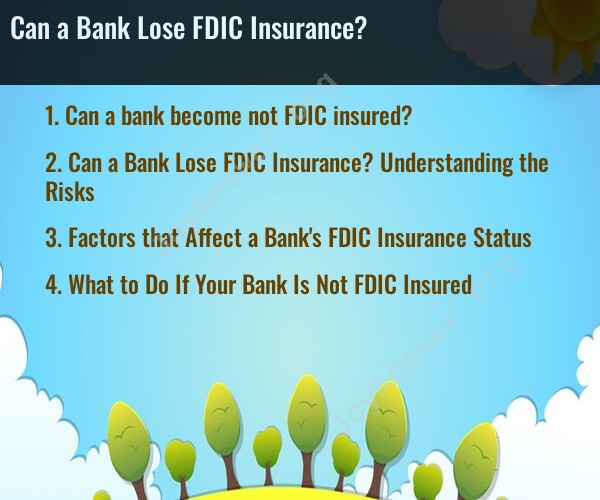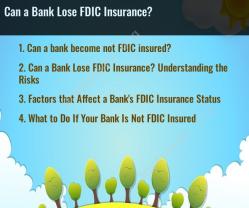Can a bank become not FDIC insured?
Banks in the United States that are FDIC-insured (Federal Deposit Insurance Corporation) are subject to regulations and standards to maintain their FDIC insurance. The FDIC insurance is designed to protect depositors and ensure the stability of the banking system. While it is rare, there are situations in which a bank can lose its FDIC insurance. Here are some of the circumstances that could lead to a bank losing FDIC insurance:
Financial Insolvency: If a bank becomes financially insolvent and is unable to meet its obligations to depositors, the FDIC may step in and take over the bank to protect depositors. In such cases, the FDIC may work to sell the bank's assets and liabilities to another institution. The bank may lose its FDIC insurance as a result.
Failure to Meet Regulatory Standards: Banks are required to meet various regulatory standards and capital requirements to maintain their FDIC insurance. If a bank consistently fails to meet these standards, it may be subject to regulatory actions, including the potential loss of FDIC insurance.
Criminal Activity or Fraud: If a bank engages in criminal activity, such as money laundering or fraudulent practices, it may face legal actions that could result in the loss of FDIC insurance.
Voluntary Decision: In some cases, a bank may voluntarily decide to relinquish its FDIC insurance. This could happen if the bank wants to convert to a different type of institution or if it wishes to operate without the benefits and obligations of FDIC insurance.
Mergers and Acquisitions: When a bank is acquired by another financial institution, the acquiring bank typically assumes the FDIC insurance for the deposits of the bank being acquired. However, in some cases, the acquiring bank may choose not to continue the FDIC insurance for the acquired bank's deposits.
It's important to note that the FDIC's primary goal is to protect depositors, and it works to ensure the smooth transition of insured deposits in the event that a bank loses its FDIC insurance. Customers are generally protected up to the maximum coverage limit established by the FDIC, which is currently $250,000 per depositor, per ownership category, at each insured bank.
If you have concerns about the FDIC insurance status of a specific bank or the safety of your deposits, it's a good idea to contact the bank directly or check the FDIC's official website for up-to-date information on the insurance status of banks in the United States.
Can a Bank Lose FDIC Insurance? Understanding the Risks
Yes, a bank can lose FDIC insurance. The FDIC (Federal Deposit Insurance Corporation) is an independent agency of the United States government that protects bank depositors against the loss of their insured deposits in the event that an FDIC-insured bank or savings association fails. However, the FDIC does not insure all banks, and it can revoke its insurance from banks that fail to meet its requirements.
Factors that Affect a Bank's FDIC Insurance Status
There are a number of factors that can affect a bank's FDIC insurance status, including:
- The bank's financial health: The FDIC regularly assesses the financial health of all FDIC-insured banks. If a bank's financial health deteriorates, the FDIC may revoke its insurance.
- The bank's compliance with FDIC regulations: The FDIC has a number of regulations that all FDIC-insured banks must comply with. If a bank fails to comply with these regulations, the FDIC may revoke its insurance.
- The bank's ownership structure: The FDIC may revoke its insurance from banks that are owned by foreign entities or that are not in compliance with US banking laws.
What to Do If Your Bank Is Not FDIC Insured
If your bank is not FDIC insured, you should take steps to protect your deposits. You can do this by:
- Diversifying your deposits: Spread your deposits across multiple banks, so that you are not reliant on a single bank.
- Choosing banks that are well-capitalized: Well-capitalized banks are less likely to fail.
- Considering other deposit insurance options: There are a number of other options for deposit insurance, such as the National Credit Union Administration (NCUA) and the Securities Investor Protection Corporation (SIPC).
You can check to see if your bank is FDIC insured by using the FDIC's BankFind tool.
It is important to note that even if your bank is not FDIC insured, you may still have some protection for your deposits. For example, if your bank is a member of the Federal Reserve System, your deposits may be insured by the Federal Reserve. Additionally, many states have their own deposit insurance programs.
If you have any questions about your bank's FDIC insurance status, you should contact your bank or the FDIC directly.


